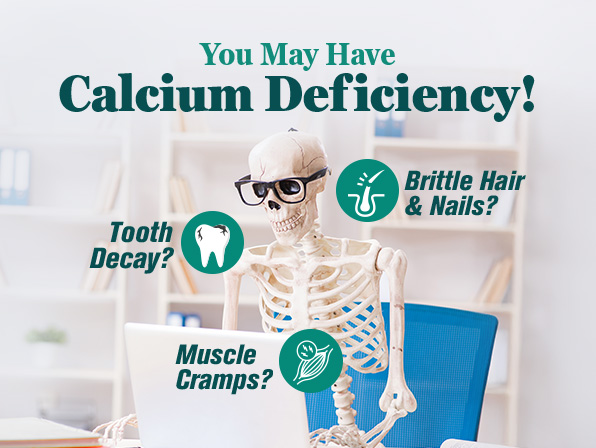Calcium
Type: Mineral
Calcium is a mineral important for strong bones and teeth, healthy blood clotting, muscle contraction and nerve function. It is the most abundant mineral (99%) to maintain high bone density, which is important in lowering risks of osteoporosis; a bone disease characterised by weak and brittle bones. A knock or fall may cause bone fractures, and common fracture sites are spine, hip, wrist and forearm.
As we age, more bone cells are broken down than they are replaced hence the risk of osteoporosis is higher for elderly individuals. What is concerning is that a bone fracture may lead to premature death for the elderly! Another group of individuals with a higher risk of osteoporosis is women past menopause stage due to the decreased levels of protective hormone, estrogen. The lack of estrogen results in bone cells breaking down faster than its formation. What's more, a deficiency of calcium in blood may trigger the body to transfer calcium from the bones to compensate for the shortfall but at the expense of the bone mineral density. This also increases the risk of osteoporosis. Therefore it is important to ensure an adequate amount of calcium.
Common food sources include dairy foods (e.g. milk, yoghurt and cheese), sardines with bones, nuts and legumes, leafy green vegetables (e.g. spinach) and calcium-fortified products (e.g. high calcium soy milk, breakfast cereal). For optimal calcium absorption, take vitamin D and magnesium as well because all these nutrients work better together.
Obtaining adequate amounts of calcium can be challenging, particularly for vegans, ovo-vegetarians (vegetarians who can eat eggs but not dairy), and individuals who are lactose intolerant. Prolonged period of insufficient calcium in our body can induce symptoms, such as muscle spasms or cramps, weak, brittle nails, and fragile skin.
Stay Inspired with Health Trends

Ready To Indulge In CNY Goodies? Before You Do, Read This!

2026 Wellness Reset: MORE Hustle, LESS Burnout

7 Secrets You Need To Stop Hiding From Your Health Advisor!

Movember Reminder – Let’s Talk Men’s Health👨🏻🦱🩺

Is Your 9-to-6 Weakening Your Bones? Here’s How To Fight Back!

Sedentary Lifestyle: The Hidden Hazard to Your Health

🏓Power Up Your Pickleball Game

Your Desk Could Be Dirtier Than A Toilet Seat 🦠

Weight Management at Work (that does not require eating salads 🥗)

The Bitter Side of Sweet: Sugar Speeds Up Ageing & Slows You Down at Work

Keep An Eye On It – Protect Your 👀 In The Digital Age

Is Your Child Driving You Crazy? Here Are 7 Supplements To Help You Stay Calm and Sane.

🌸 Happy Mother's Day

Ingredient Spotlight: Placenta and NMN

What is Revenge Sleeping Procrastination?

8 Tips For Building Mental Resilience In Your Child

7 Amazing Facts About Women

How Burned Out Are You?


